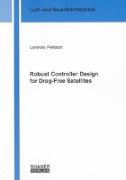- Start
- Robust Controller Design for Drag-Free Satellites
Robust Controller Design for Drag-Free Satellites
Angebote / Angebote:
The drag-free satellite concept has been considered in the past for scientific missions where it is necessary to put a test mass into an ultra-quiet free-fall condition. This requires the design of a drag-free controller able to reduce the non-gravitational accelerations acting on the test mass to extremely low values. The design of such controller relies on the model of the system available. It is usually very expensive and sometimes even impossible to model the satellite dynamic to an accuracy level comparable to the one associated to the free-fall requirement. For this reason, the control system must be robust against the uncertainties present in the model. The issue of robustness of drag-free controllers is investigated in this work under two different points of view, namely analysis of robustness and synthesis of robust controllers. First the robustness of performance of a controller implemented on a real mission is investigated. The result of the analysis shows that robustness of performance must be properly taken into account during the design of a drag-free satellite in order to decrease the costs associated to the mission development and not to compromise the success of the mission. Moreover, the results of the analysis provide informations about the parameters most responsible for the lost of performance of the system. This is very useful in the case in which a system redesign is required. In the second part of the present work, the problem of designing a robust controller for a drag-free satellite is addressed. In particular, existing and novel tools are introduced in order to tackle in a systematic manner the design of a drag-free controller for plants subject to uncertainties. Approximation techniques are first exploited in order to reduce the complexity of the plant used for controller design. Afterward, the scientific performance objective is broken down into control specifications, taking into account the uncertainty in the system. Finally, a novel synthesis technique based on the mixed structured singular value is introduced to design the controller that robustly satisfy the control specifications derived in the previous phase. The technique proposed is applied first to a benchmark problem, considered representative of the most modern drag-free missions, and then to a more realistic example, for which a nonlinear simulator was available. The results show that the method proposed allows to properly account for the uncertainties in the design plant while keeping the controller complexity to a minimum level.
Libri-Titel folgt in ca. 2 Arbeitstagen




